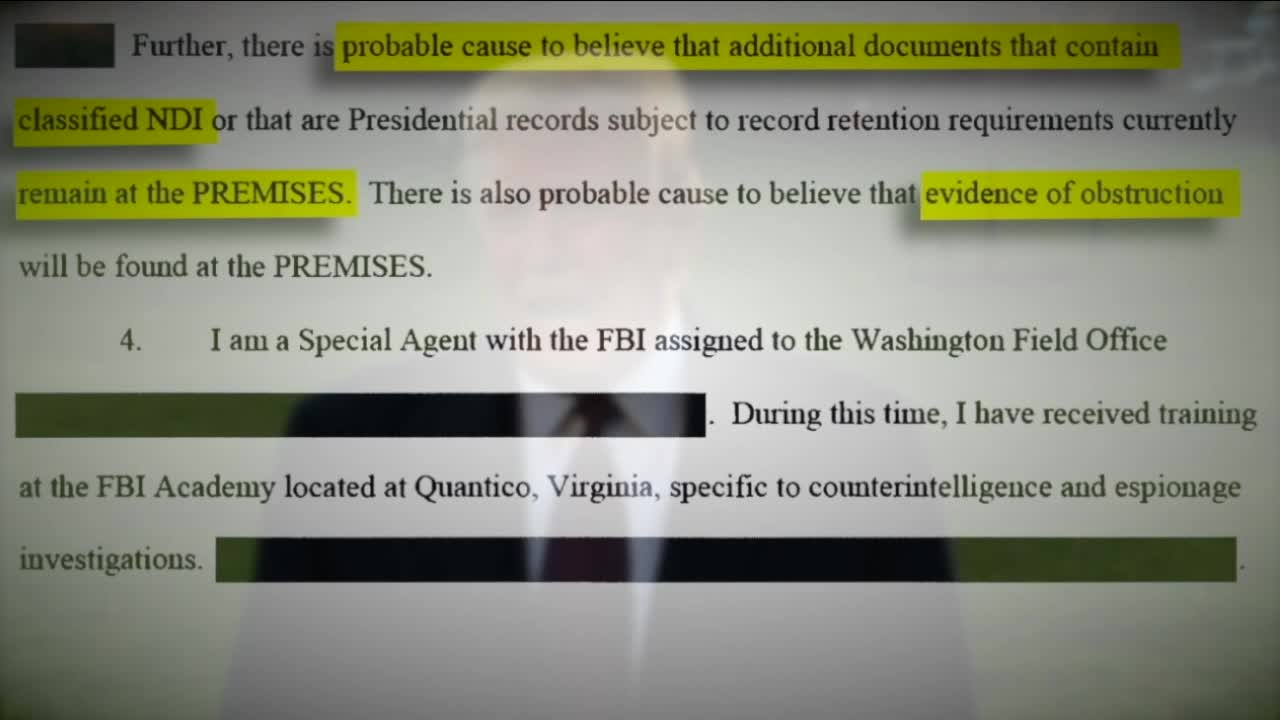A heavily redacted federal affidavit reveals more about what led federal agents to believe they had no other choice but to search former President Donald Trump’s Mar-A-Lago estate.
In the 38-page heavily redacted federal affidavit, 24 pages are redacted in some way, and about a dozen pages are fully blacked out to the public.
But what is in plain view offers some additional insight into why FBI agents believed inside Donald Trump’s Palm Beach estate was "evidence, contraband, fruits of crime, or other items illegally possessed" by the nation’s former President, according to the affidavit filed by the Department of Justice (DOJ) on Friday.
According to the affidavit, the DOJ opened its criminal investigation back in February 2021 after being referred by the National Archives and Records Administration or NARA.
At the time, NARA had reported that within 15 boxes of records it had received back from the former President, they found newspapers, magazines, photos, presidential correspondence, and “a lot of classified records.”
“Of most significant concern,” the affidavit said, was that “the highly classified records were unfoldered, intermixed with other records and unproperly identified.”
NARA’s findings prompted the FBI to determine how “documents with classification marking were removed from the White House.” The affidavit states that agents had probable cause to believe “additional documents containing national defense information” remained at Mar-A-Lago.” They also cited probable cause to believe they would find “evidence of obstruction,” according to the court record.
According to the affidavit, NARA had been requesting missing Presidential records from the former President since May of 2021 and continued through the end of that year when “12 boxes” were found at Mar-A-Lago.
This past May, FBI agents reviewed the contents of all 15 boxes retrieved by NARA and found approximately “184 unique documents bearing classification markings.” Those documents included (67) marked as CONFIDENTIAL, (92) marked SECRET, and (25) documents marked TOP SECRET.
According to the affidavit, agents found the markings on some information and intelligence considered so secret its “disclosure could be expected to result in damage to national security.”
The affidavit also included a May 2022 letter from Trump’s attorney, M. Evan Corcoran. In it, Corcoran stated, in reference to the DOJ’s Presidential Records Investigation, “public trust in the government is low. It is critical, given that dynamic, that every effort is made to ensure actions by the DOJ that may touch upon the former President, or his close associates, do not involve politics.”
Corcoran also stated how Trump “readily and voluntarily agreed to transfer” boxes to the national archives. Then “leaks followed, and once DOJ got involved, leaks continued,” his attorney stated.
“Leaks about an investigation that involved the residence of a former President who is still active on the national political scene are particularly troublesome,” Corcoran stated.
On August 8, when federal agents executed a search warrant at Mar-A-Lago, among the items seized included 28 different boxes, including an unknown number of documents marked secret and top secret.






